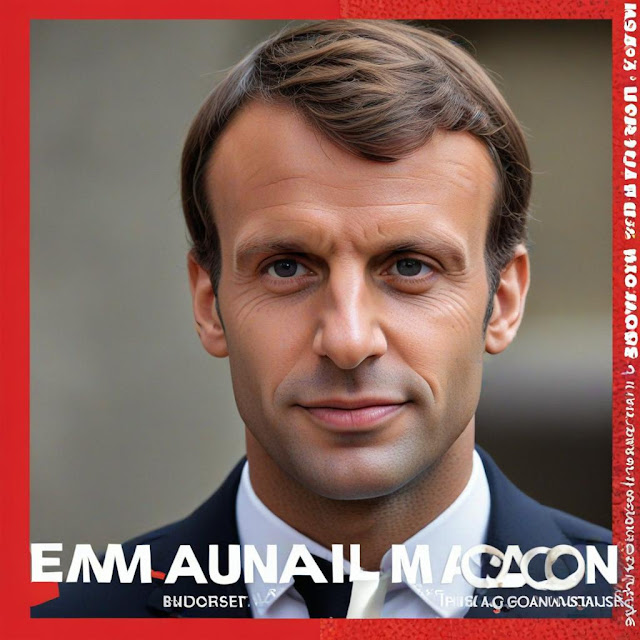Emmanuel Macron
Early Life and Education
Emmanuel Macron was born on December 21, 1977, in Amiens, France. He was raised in a well-to-do family; his father, Jean-Michel Macron, was a professor of neurology, and his mother, Françoise Noguès, was a physician. Macron’s upbringing was intellectually stimulating, surrounded by books and discussions that nurtured his ambition and curiosity.
From an early age, Macron displayed a keen interest in philosophy and the arts. He attended the prestigious Lycée la Providence in Amiens, where he excelled academically. After high school, he moved to Paris to pursue higher education, studying at the University of Paris-Ouest Nanterre La Défense, where he earned a degree in philosophy. He later attended Sciences Po, one of France's leading political science schools, where he completed a Master’s degree in Public Affairs.
Early Career
Macron’s career began in the public sector. He worked at the French Ministry of Economy, Industry, and Digital Affairs, where he gained valuable experience in government and policy-making. In 2008, he joined the investment bank Rothschild & Cie, where he quickly rose through the ranks and became a partner. His work at Rothschild allowed him to develop a strong network in business and finance, which would later play a crucial role in his political career.
Entry into Politics
Macron's political journey began in earnest in 2012 when he joined the Socialist Party. He became an advisor to then-President François Hollande, focusing on economic and financial matters. His rapid ascent within the party culminated in his appointment as Minister of Economy, Industry, and Digital Affairs in 2014. In this role, he championed pro-business reforms and advocated for a more liberal economic policy, often clashing with the party's more traditional left-wing elements.
Founding En Marche!
In 2016, Macron made the bold decision to resign from his ministerial position and launch his own political movement, En Marche! (literally "On the Move"). His vision was to create a centrist platform that transcended the traditional left-right political divide in France. En Marche! quickly gained traction, appealing to a wide range of voters disillusioned with established political parties.
Macron positioned himself as a candidate for the 2017 presidential election, advocating for progressive reforms, a strong European Union, and a new economic model focused on innovation and entrepreneurship. His campaign was marked by a charismatic presence and a focus on optimism and change, resonating particularly with younger voters.
2017 Presidential Election
Macron’s campaign took off, and he emerged as a leading candidate in the first round of the election held on April 23, 2017. He secured a spot in the runoff against far-right candidate Marine Le Pen, receiving significant support from various political factions. On May 7, 2017, Macron won the presidency with a decisive 66.1% of the vote, becoming the youngest President in French history at the age of 39.
Presidential Policies and Achievements
Macron’s presidency began with ambitious plans to reform the French economy and strengthen the European Union. His government implemented labor market reforms aimed at reducing unemployment and boosting competitiveness. These reforms included easing regulations on hiring and firing, as well as reforms to vocational training and apprenticeships.
Macron also focused on climate change and sustainability. He hosted the One Planet Summit in 2017 to promote global action on climate issues and reinforced France’s commitment to the Paris Agreement. His government made significant investments in renewable energy and aimed to reduce France’s reliance on fossil fuels.
However, Macron’s presidency has not been without challenges. His pro-business reforms faced significant opposition, leading to widespread protests, notably the "Yellow Vest" movement that began in late 2018. The movement originated as a protest against fuel tax hikes but expanded to encompass broader grievances regarding economic inequality and the perceived elitism of Macron’s government.
Reelection and Continued Challenges
Despite the challenges, Macron successfully navigated the political landscape and was reelected in April 2022, defeating Marine Le Pen again in the runoff. His second term focused on addressing the ongoing effects of the COVID-19 pandemic, economic recovery, and deepening European integration. He also emphasized social issues, such as gender equality and racial justice, aiming to create a more inclusive society.
However, Macron's second term has also faced significant hurdles. Rising inflation, the energy crisis stemming from the war in Ukraine, and domestic unrest over pension reforms have tested his leadership. Strikes and protests erupted over proposals to raise the retirement age, reflecting the ongoing discontent among segments of the French population.
Personal Life
Emmanuel Macron is married to Brigitte Trogneux, a former teacher who is 24 years his senior. The couple met when Macron was a teenager, and they began a relationship when he was just 16 years old. Their unconventional romance has attracted significant media attention, but the couple has remained steadfast in their commitment to each other. They have no children together, though Macron is stepfather to Brigitte's three adult children from a previous marriage.
Macron is known for his interests in literature, philosophy, and history, often drawing on these themes in his speeches and policies. He speaks fluent English and has a keen appreciation for the arts, frequently attending cultural events and promoting French culture on the global stage.
Conclusion
Emmanuel Macron's journey from a small-town boy in Amiens to the President of France is a testament to his ambition, intellect, and determination. As a centrist leader, he has sought to navigate the complexities of modern politics in a rapidly changing world. His presidency reflects both the aspirations and the challenges facing France today—striving for economic growth and social equality while maintaining France's role within a united Europe. As he continues to lead France through turbulent times, Macron’s legacy will be shaped by his ability to reconcile the diverse interests of his constituents and adapt to the evolving political landscape.


